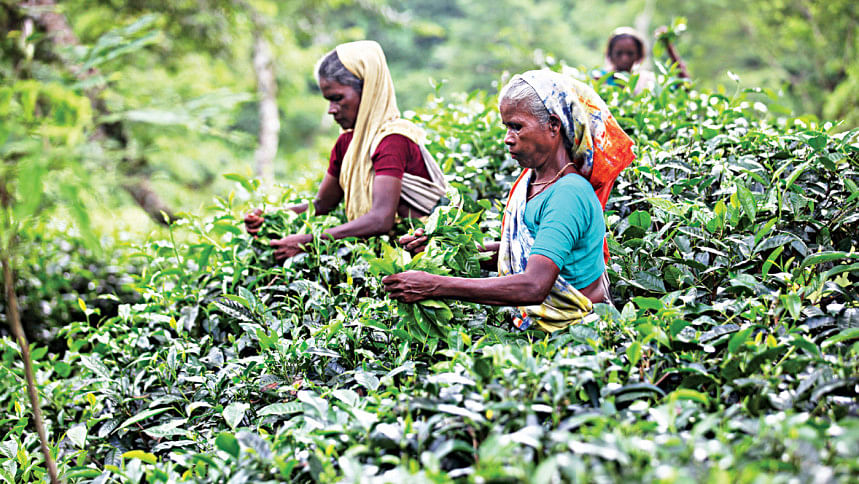Tea production takes a hit from bad weather

Tea production in Bangladesh will likely decline this year due to adverse weather, namely sporadic bursts of rain and subsequent flooding, according to market players.
Heavy rains eroded the topsoil, washed away fertilisers and increased pest infestations during the budding period of tea plants, they said.
As a result, experts predict a 10 percent decrease in production compared to that last year.
Data of Bangladesh Tea Association (BTA) and Bangladesh Tea Board (BTB) show that the rains began in February.
And although producers initially viewed it as beneficial, the recurrent heavy rainfall ultimately harmed cultivation.
Besides, overcast conditions left the ground excessively damp amid insufficient sunlight, allowing pests such as red spider mites to thrive.
This poor environment significantly weakened the tea plants and thereby led to reduced budding, impacting the yields of many tea gardens in major producing areas, such as Moulvibazar in Sylhet.
Bangladesh produced 10.29 million kilogrammes of tea in 2023, which is 900,000 kilogrammes more than this year's production target, according to Bangladesh Tea Association and Bangladesh Tea Board
As per the BTA and BTB data, this year's production target is 10.8 million kilogrammes (kgs). Now though, the feasibility of this goal has been thrown into doubt for these challenges.
The total tea production stood at about 4.95 million kgs as of September while it was 5.47 million kgs by the same time last year.
Also, the country's overall tea yields reached 10.29 million kgs by the end of 2023, which is 900,000 kgs more than the current production target.
Nomita Bauri, who works at a tea garden in Moulvibazar, said the heat at her plantation has been unprecedented this year despite the recurrent rain.
"The leaves have hardened so I struggle to pick even 15 kgs per day even though I would typically harvest up to 60 kgs daily at this time each year," she said.
Other tea workers share Nomita's plight as high temperatures and unfavourable rainfall stunted the plant's ability to produce new leaves.
Workers also noted a decline in water levels in lakes and other reservoirs used for irrigation, further compounding the problem. Moreover, the increase in red spider mite infestations means they are picking significantly less tea.
According to Md Anisur Rahman, a meteorologist at the Sreemangal Meteorological Office, the district saw rainfall of 2.716 metres from January to September this year compared to 2.009 metres at the same time last year.
Golam Mohammad Shibli, general manager of Finlay Tea Company and chairman of the BTA's Sylhet branch, said although sufficient rain was essential for tea, adequate sunshine is equally important.
"Current production is 10 percent below normal. We might be able to recover some losses if we get the right balance between sun and rain, but not all," he added.
He also noted concerns about the quality of tea coming from North Bengal and issues with tea being smuggled into Bangladesh, which negatively impacts auction prices.
Shamim Ahmed Chowdhury, manager of Shirajnagor Tea Garden, said tea production was projected to decline this year due to a series of adverse weather conditions.
"The rainfall has nearly doubled compared to last year, with four instances of flooding alongside unusually high temperatures," he added.
Against this backdrop, Chowdhury also predicted that overall tea production would be about 10 percent less compared to last year.
AKM Rafiqul Haque, director of the BTA's Project Development Unit, said high temperatures and heavy rain hindered tea plants' ability to photosynthesise and produce buds.
Dr Wahiduzzaman, head of the Department of Food Engineering and Tea Technology at the Shahjalal University of Science and Technology, said climate change has become a thorn in the side for tea growers.
"At a time when the gardens are supposed to be covered with green leaves, almost every garden is burning due to drought. Attention should be paid to innovating in harmony with the environment," he added.
Wahiduzzaman also said many countries have developed tea varieties that are suitable for their climate.
"But it did not happen here. So, we need to do more research," he added.
M Shah Alam, chairman of the board of trustees of a BCS provident fund of the BTA, said many tea gardens were closing down, significantly impacting overall tea production.
"When gardens shut down, female workers suffer while men usually have alternative options for employment. So, it is crucial to support this sector, which sustains about 700,000 people," he said.
Alam also informed that rising gas and electricity prices are creating more challenges in production.
"Currently, the cost to produce tea is Tk 230 per kg while the auction price has dropped to Tk 211 per kg. So, we will face greater losses if cannot manage these issues," he said.
"Therefore, it is essential for the government to focus on this sector. I urge the government to provide agricultural loans with interest of up to 4 percent to help sustain the tea sector," Alam added.

 For all latest news, follow The Daily Star's Google News channel.
For all latest news, follow The Daily Star's Google News channel. 



Comments